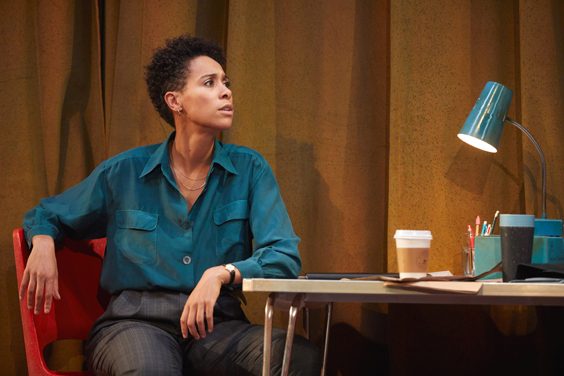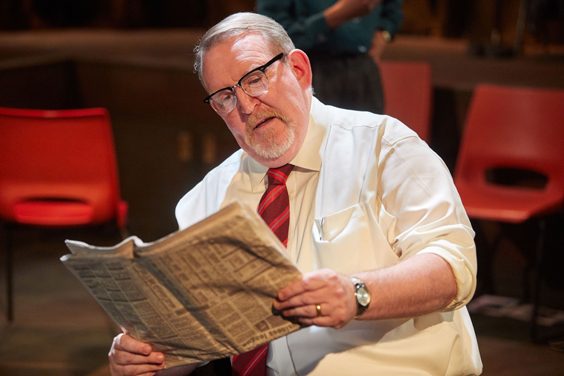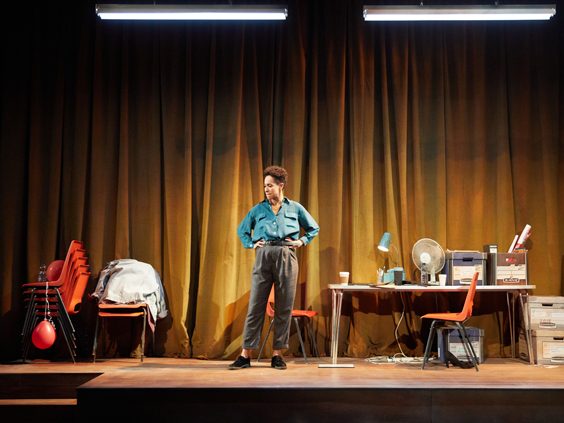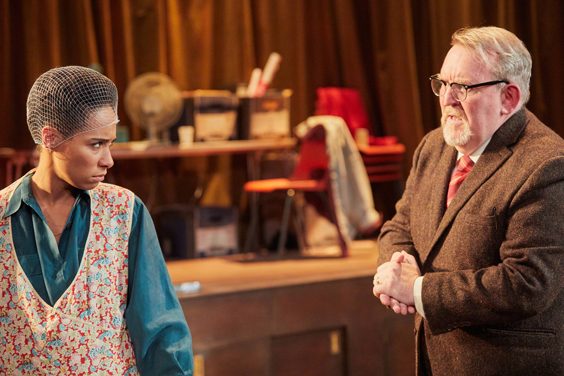Steel – Review – Sheffield Crucible Studio
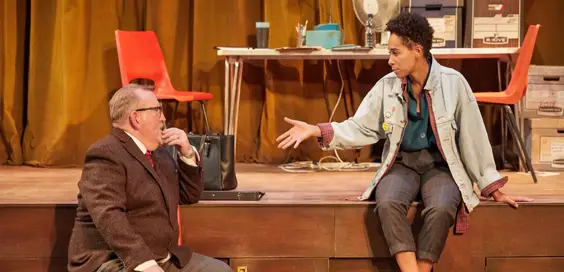
By Eve Luddington, September 2018
How much, or how little, has changed in 30 years for women pursing political careers? This is the major question posed in Steel, a witty new play set in an unnamed city very much like Sheffield, by Sheffield-born writer, Chris Bush. It’s one for all people interested in politics but most markedly, for those who are interested in tracing the journey of women fighting for a political voice. If, in addition, you know something of Sheffield and its traditions, this play may speak volumes to you.
By flitting between two time-frames (1988 and 2018) Bush makes comparisons for us. By using only two characters per scenario, each made in a similar mould to their historical counterpart (and played by the same actor), she underlines her comparisons.
Rebecca Scroggs plays local woman, Josie, in 1988 and Vanessa in 2018, locally born but resident in London for several years. Both are feisty Labour Party women of colour in their 30s. Josie, full of intelligence and spark but lacking confidence, is persuaded to seek political office on the council and is wittily self-disparaging. Vanessa, a politically astute former MP, descends on the Northern city with an acerbic tongue and confidence perceived as arrogance. Her quest is to become Metro Mayor.
“Embodiment of a hopeful future”
Dai in 1988 and Ian in 2018 are both played by Nigel Betts. Dai is Welsh by birth and a Yorkshireman by residence, a longstanding Labour councillor. He seems a sturdy avuncular figure, guiding Josie through the sexism and violent racism she and her family encounter. But of course, the soup he thoughtfully brings her when she’s ill is made by his wife. And Dai isn’t quite the reliable friend and supporter he seems.
Ian, in 2018, is Yorkshire to his roots. Deputy Leader of the council and Vanessa’s Election Officer, he’s overtly anti-pathetic to Vanessa, his aversion based more apparently on her metrocentric attitude than her gender or colour. When she’s trolled as a black female and Westminster-weaned to boot, his concern is for the reputation of his beloved Labour Party rather than her well-being. But ultimately, while Dai regards Josie as the embodiment of a hopeful future and Ian fears the future Vanessa represents, Dai and Ian are one of a type. Both fail to understand what makes women tick: both make huge assumptions about them, manipulate them and, ultimately, are revealed to be cruelly self-serving.
“Pithy one-liners”
We come to realise that 30 years, circumstance and altered socio-political attitudes have created the main differences between the characters. Other than that, the two women are distinguished only by different accents; they wear the same basic outfit. The same applies to the men, both apparently ‘salt-of-the-earth’ characters in their 60s, whose role is to support the women in their political quest and whose underlying attitudes undermine them. I get the impression that Bush intends us to recognise that Josie and Dai might well be Vanessa and Ian if they’d been born 30 years later.
For me, Bush’s premise is somewhat predictable as is her basic conclusion. The play feels like her personal question-and-answer journey, and she stamps her own opinions firmly on the end. There is nothing wrong with that, of course; it’s the nature of the journey that counts. For me, it was one of two halves.
Throughout, there’s lots of humour in revealing banter and pithy one-liners. There are in-jokes for Sheffield folk and fun to be had over the North-South divide. Josie’s take on Victoria Wood’s ‘Two soups’ sketch is endearingly hilarious, and Ian’s opinion of skinny latte turns into a pointed running gag. But for most of the first Act the discourse, in scenes of almost equal length and similar pacing, didn’t grab me.
“Energy and drive”
The actors have great rapport and bring life to their characters. It’s entirely fitting that the woman’s voice is sometimes much quieter than the man’s but, for the sake of audibility, I would have preferred Scroggs to mutter with more projection. Otherwise, I was impressed by both performers. Scroggs is eminently watchable and her mobile features communicate very effectively her characters’ emotions. There’s a good physical contrast between the reticent Josie and upfront, assertive Vanessa. Nigel Betts, a strong, solid actor, epitomises a traditional working-class Labour type in both his roles.
But neither has much to get their teeth into until the last 10 minutes or so of the first half (I’m afraid I was marking time). Then, things change.
Steel is the title of the play, and multiple interpretations of steel are used to bring real energy and drive to the drama, particularly in the public speeches given by Vanessa and Ian. These are played with utter conviction by Scroggs and Betts. By the interval, we get the feeling that sparks will fly in the second half. And they do.
“Rousing speech”
The writing, direction (by Rebecca Frecknall) and acting come together in Act II to produce some powerful drama. The tense and shocking climax of Dai and Josie’s interaction was directed brilliantly and played impeccably by Scroggs and Betts. It drew a collective intake of breath from the audience.
The revelation by Vanessa that the role model she’s created for herself is a woman called Josie is a clever device by Bush to link the past to the present and unite the theme of the play, and it’s communicated with passionate belief and stirring power by Scraggs. So too, is Vanessa’s final, rousing speech.
I left at the end far more impressed by this new play than I had been at the interval. It’s a brave attempt to personalise, dramatise and bring bang up-to-date, 30 years of women’s fight for equality. In many ways, I think it succeeds. And, at times, it’s very funny. Most significantly, it tests the saying quoted by both female characters, ‘A woman is like a teabag – you never know how strong she is until you put her in hot water.’
images: Mark Douet
